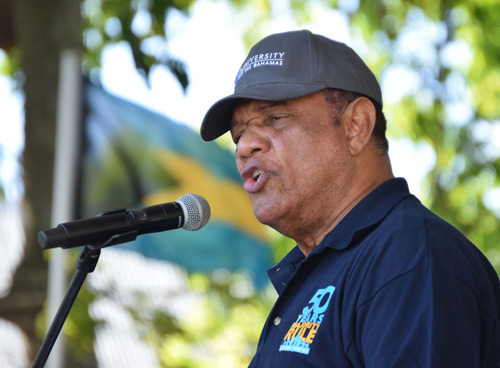
NASSAU, The Bahamas — Prime Minister and Minister of Finance the Rt. Hon. Perry Christie said, during the 50th Anniversary of Majority Day Celebration on the Southern Recreation Grounds, that January 10th is a day on the National Calendar that belongs to all Bahamians, regardless of background, politics, race or social and economic status.
“January 10th must be commemorated and celebrated by all of us because it truly represents one of the great, defining moments in our evolution as a people,” Prime Minister Christie said, on January 10, 2017.
He added that, with the exception of the Emancipation from slavery in 1834 and Independence in 1973, there is no event with more consequence and historical importance than the attainment of Majority Rule, which unfolded January 10, 1967.
“It is for us to know and to accept that January 10, 1967 represents the transition from the Old Bahamas to a New Bahamas — the point of transition from minority government to majority government; the point of transition to a modern democracy,” Prime Minister Christie said.
He noted that it also represented “one of the highest pinnacles” in the historic and still ongoing struggle of The Bahamian people.
“Once it took place, there was a commitment for economic empowerment, for equality of opportunity and for social justice,” Prime Minister Christie said.
He pointed out that the date was not an end, nor even a beginning.
“Instead it was an important milestone in a journey that was begun centuries ago when some anonymous slave struck a blow for freedom for the first time,” Prime Minister Christie stated. “It is a journey that continued with slaves like Pompey in Exuma and Black Dick in Cat Island who, with others in the early 1830s — against the most overwhelming odds — struck their blows for freedom and for justice.”
He added that it is a journey that continues with men like Stephen Dillet, Thomas Minns and John P. Deane, who “struck their blow” for a more just society when, after years of agitation and struggle for the right to vote, they won election to the House of Assembly — the very first men of colour to do so in The Bahamas.
“The journey continued with men like James Carmichael Smith, originally from Port Howe, Cat Island, who in the 1880’s struck his blow for a better Bahamas by leading the protest for a more just and equitable society for all Bahamians,” he noted.
The journey continued into the 20th century, Prime Minister Christie said, with men like W.P. Adderley, Etienne Dupuch, T.A. Toote, Gerald Cash, Leon Walton Young, C.R. Walker, Milo Boughton Butler, and others who, each in his own way, “struck a major blow for a better Bahamas.”
He added that the journey continued with Clifford Darling and Clarence Bain; and with H.M. Taylor, Cyril Stevenson and William Cartwright, and, most pivotally of all, with Lynden Pindling, and “that mighty band of brothers and sisters” who joined with him to build a new Bahamas and a new Bahamian — upward-striving and free.
Prime Minister Christie said he reflected on the contributions of persons like A. D. Hanna, Sir Cecil Wallace-Whitfield, Carlton Francis, Dame Doris Johnson, Sir Arthur Foulkes and Sir Clement T. Maynard.
He also referred to Paul Adderley, Sir Orville Turnquest and Sir Arlington Butler; as well as Elwood Donaldson, Maurice Moore, and the men and women who played a part in building The Bahamas.
Prime Minister Christie highlighted an event referred to as BlackTuesday, when — in 1965 — Sir Lynden Pindling and Sir Milo Butler threw the Mace and the hourglass, respectively, out of the window of the House of Assembly, and Sir Cecil Wallace Whitfield admonished the crowd outside to stand strong for that event.
He referred to a photograph on display in Rawson Square that captured the event.
“All of that happened on the day in 1965 that we categorize as BlackTuesday, when men and women stood and stood strong, and sent a signal that they were not going to compromise on the need for change,” Prime Minister Christie said.
“That is why we must call their names,” he pointed out. “That is why we must lift up their memories.”
By Eric Rose
Bahamas Information Services





